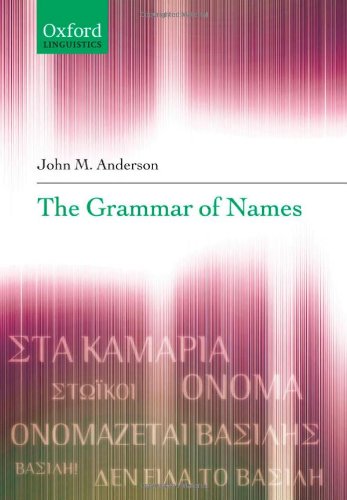

Most ebook files are in PDF format, so you can easily read them using various software such as Foxit Reader or directly on the Google Chrome browser.
Some ebook files are released by publishers in other formats such as .awz, .mobi, .epub, .fb2, etc. You may need to install specific software to read these formats on mobile/PC, such as Calibre.
Please read the tutorial at this link. https://ebooknice.com/page/post?id=faq
We offer FREE conversion to the popular formats you request; however, this may take some time. Therefore, right after payment, please email us, and we will try to provide the service as quickly as possible.
For some exceptional file formats or broken links (if any), please refrain from opening any disputes. Instead, email us first, and we will try to assist within a maximum of 6 hours.
EbookNice Team

Status:
Available4.8
33 reviews
ISBN 10: 019929741X
ISBN 13: 9780199297412
Author: John M Anderson
This book is the first systematic account of the syntax and semantics of names. Drawing on work in onomastics, philosophy, and linguistics John Anderson examines the distribution and subcategorization of names within a framework of syntactic categories, and considers how the morphosyntactic behaviour of names connects to their semantic roles. He argues that names occur in two basic circumstances: one involving vocatives and their use in naming predications, where they are not definite; the other their use as arguments of predicators, where they are definite. This division is discussed in relation to English, French, Greek, and Seri, and a range of other languages. Professor Anderson reveals that the semantic status of names, including prototypicality, is crucial to understanding their morphosyntax and role in derivational relationships. He shows that semantically coherent subsets of names, such as those referring to people and places, are characterized by morphosyntactic properties which may vary from language to language. His original and important investigation will appeal to scholars and advanced students of linguistics and philosophy.
Part I: Why Names?
1 Notional Grammar and Names
1.1 What is notional grammar?
1.2 The semantics vs. the morphosyntax of names
1.3 Conclusion and prospect
2 Implementation of a notional grammar
2.1 Preamble
2.2 A notional system of syntactic categories
2.3 Categories and syntax
2.4 Conclusion and prospect
Part II: Approaches to the Study of Names
3 Prelude to a survey of name studies
3.1 The three traditions
3.2 A working framework for semantics
4 Onomastics
4.1 Preamble
4.2 Traditional onomastics
4.3 Some recent work in onomastic theory
4.4 Conclusion
5 Remarks on the philosophy of names
5.1 Mill
5.2 ‘Descriptivism’
5.3 The ‘descriptivist’ critique of Mill
5.4 ‘Rigid designation’, ‘baptisms’, and ‘direct reference’
5.5 Conclusion
6 Studies on the linguistics of names
6.1 The semantics of names
6.2 The categorization of names
6.3 Classes of name and derivation
6.4 Conclusion
Part III: Towards a Grammar of Names
7 Observations concerning names and related categories
7.1 The roles of names: identification, nomination, address
7.2 Names vs. determiners and pronouns
7.3 Names vs. generics
7.4 A brief overview
8 The syntax of names
8.1 Names and determination
8.2 The category of name
8.3 Names and nomination
8.4 Names and vocatives
8.5 Conclusion: what is a name?
9 Names and the lexicon
9.1 Classes of names and their complexity
9.2 Names as bases
9.3 Conclusion: what are names?
the book of grammar
the grammar of names pdf
the grammar of names
grammar book online
a grammar of the english language
Tags: John M Anderson, Grammar, Names